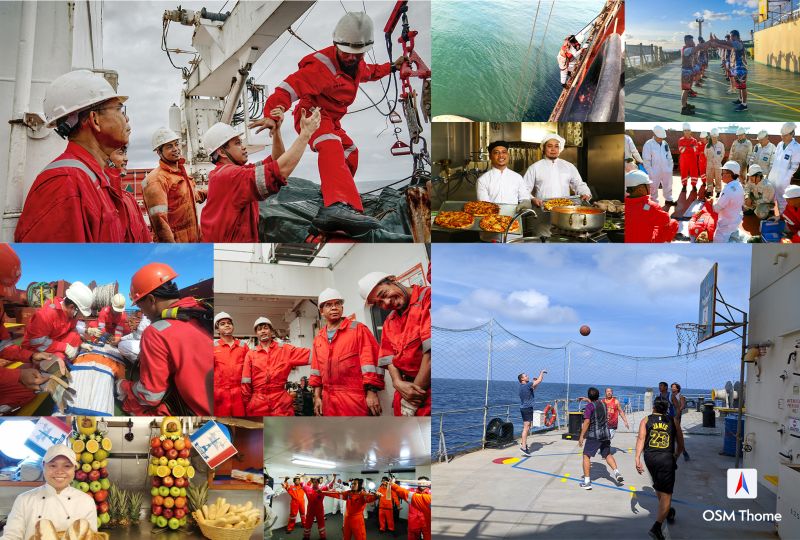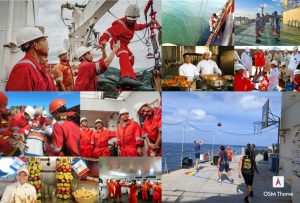Life at sea presents seafarers with a unique set of mental health challenges due to isolation, demanding workloads, and prolonged time away from family. These conditions can lead to stress, anxiety, and depression, negatively impacting both individual well-being and overall vessel performance. Mental health training equips crew members with the skills to manage these challenges, fostering resilience and enhancing onboard safety. This article explores the importance of mental health education, wellness programs, and industry-wide initiatives aimed at improving seafarer well-being. Mental health training addresses the emotional and psychological challenges faced by seafarers, enabling them to navigate high-pressure environments effectively. A mentally healthy crew ensures operational efficiency, reduces accident risks, and fosters a supportive onboard culture.
Industry Context and Mental Health Challenges
Seafarers frequently work in confined environments, face harsh weather conditions, and endure long voyages. Factors contributing to mental health concerns include:
- Isolation and Loneliness: Months at sea can create emotional isolation, reducing social engagement and support.
- Workplace Stress: Intense schedules, job responsibilities, and high-stakes decisions increase stress levels.
- Family Separation: Being away from loved ones for extended periods causes emotional distress.
- Unpredictable Work Conditions: Harsh weather, accidents, and maritime emergencies create additional psychological strain.
Core Components of Mental Health Training
Effective mental health training programs emphasize developing coping mechanisms, fostering emotional resilience, and encouraging peer support, forming a strong foundation for seafarers’ well-being.
Emotional Awareness and Self-Regulation
Training sessions focus on helping seafarers recognize early signs of stress, anxiety, and depression while teaching self-regulation techniques. Mindfulness and relaxation exercises, such as deep breathing and meditation, promote mental clarity and calmness. Stress management techniques enable seafarers to identify triggers and respond proactively through effective problem-solving strategies.
Peer Support and Team Collaboration
Fostering a supportive onboard community helps reduce isolation and builds trust among crew members. Peer mentorship programs allow senior crew members to guide and support less experienced colleagues. Open communication channels encourage discussions about mental health, reducing stigma and promoting shared responsibility for overall well-being.
Crisis Management and Emergency Response
Training prepares crew members to handle psychological emergencies stemming from onboard incidents or personal crises. Mental Health First Aid (MHFA) equips them with the skills to provide immediate support until professional help is available. Emergency response protocols outline procedures for addressing severe mental health crises, including recognizing and responding to suicidal ideation effectively.
Wellness Programs for Mental Resilience
Many shipping companies implement wellness programs to complement formal training, ensuring continuous mental health support.
1. Onboard Wellness Activities
- Fitness and Exercise Programs: Encouraging physical activity through onboard gyms and sports events.
- Social Engagement Activities: Cultural events, movie nights, and team-building exercises enhance morale.
2. Counseling and Psychological Services
- Telemedicine Support: Remote consultations with mental health professionals.
- Confidential Counseling Services: Offering private sessions through helplines or onboard visits.
3. Technology-Enabled Mental Health Support
- Mental Health Apps: Mobile applications offering mindfulness exercises, cognitive-behavioral therapy tools, and stress-tracking features.
- Wellness Portals: Integrated platforms for seafarers to access personalized mental health resources and educational content.
Industry-Wide Initiatives for Seafarer Mental Health
International organizations and shipping companies have launched initiatives to address mental health concerns at sea.
Sailors’ Society’s “Wellness at Sea” Program: This program provides workshops, online training modules, and interactive sessions focusing on emotional resilience, leadership development, and mental health awareness. Impact Example: After implementing “Wellness at Sea,” participating companies reported a 30% improvement in seafarer job satisfaction and reduced attrition rates.
The International Seafarers’ Welfare and Assistance Network (ISWAN): ISWAN’s helpline, “SeafarerHelp,” offers 24/7 confidential support for seafarers facing crises, ranging from mental health struggles to workplace disputes.
Maritime Labour Convention (MLC, 2006): The MLC includes mental health provisions, mandating fair treatment, rest periods, and access to welfare services as part of a comprehensive seafarer rights framework.
Case Studies: Real-World Impact of Mental Health Training
Case Study 1: Crew Resilience Program in a Shipping Company:A leading container shipping company introduced a structured mental health training program, combining onboard workshops and telehealth consultations. Surveys showed a 40% reduction in reported mental health issues and a 25% decrease in job-related stress indicators.
Case Study 2: Enhanced Support During the COVID-19 Pandemic: During the COVID-19 pandemic, prolonged contracts and restricted shore leave worsened seafarer mental health. In response, several shipping firms expanded wellness programs, including free telecounseling and extended Wi-Fi access, enabling more frequent contact with family.
Future Trends in Mental Health Training for Seafarers
As the maritime industry embraces digital transformation and enhanced welfare practices, mental health training will continue evolving with innovative technologies and integrated learning approaches. Virtual Reality (VR) simulations are emerging as a promising tool, allowing seafarers to experience challenging onboard scenarios in a controlled environment. These simulations enable practical stress management training, helping crew members build resilience before facing real-life maritime challenges.
Artificial intelligence (AI) is also playing a transformative role in mental health monitoring. Wearable devices that track stress indicators such as sleep patterns, heart rate, and activity levels can detect early signs of mental fatigue. This data-driven approach enables supervisors to intervene proactively, ensuring timely support and reducing the risk of mental health issues escalating onboard. Additionally, integrated training platforms are becoming a central component of mental health education. Cloud-based platforms now offer blended learning solutions that combine self-paced modules with live instructor-led sessions. This flexible format ensures continuous learning while accommodating the demanding schedules of maritime professionals.
Conclusion
Mental health training for seafarers is vital for building resilience, ensuring operational efficiency, and promoting safer maritime environments. By integrating mental health education into crew management strategies, shipping companies can address seafarers’ unique challenges while fostering a supportive, productive work culture. As industry initiatives expand and digital tools evolve, the maritime sector is poised to create a safer, healthier future for its global workforce.




